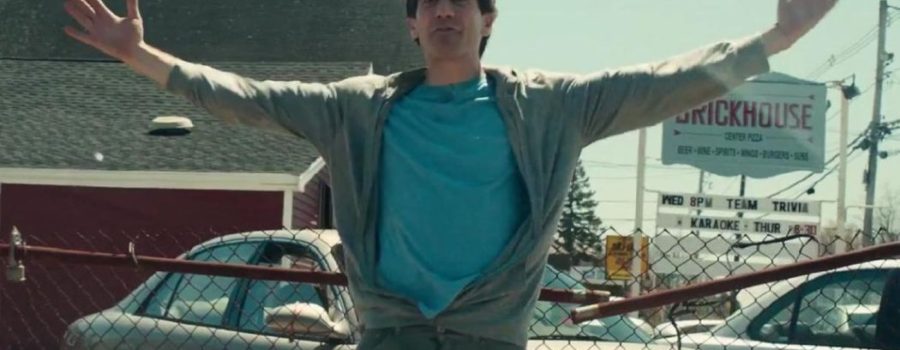[Published at Film Inquiry] Stronger is not a film about patriotism or American pride. It specifically avoids those themes to focus on its subject, Jeff Bauman and his rejection of that gut reaction of blind hatred that many people tend to possess in a time of crisis instead of being of value, his choice not to stand for America, but to stand against victims of inexplicable violence and PTSD. He chose to make a difference individually through human connection instead of trying to fill the role of the face of hope for America.
Bauman, a man who lost both of his legs during the Boston Marathon bombing of 2013 and helped the FBI identify one of the terrorists, is not a hero. He is vulnerable. He is imperfect. He is a human being with flaws. He is the living embodiment of the resiliency of the human spirit. He is an ordinary man who endured something extraordinary. He is somebody who was transformed for the better as a result of a situation that most people couldn’t fathom undergoing.
But it was not a walk in the park, not by a long shot. It was a grueling path to redemption. However, to Bauman, anyone can overcome any hardship if their will to survive is strong enough. His humble mantra rings true with human nature, his persistent deflection of the hero label onto the others that helped him overcome his hardships speak volumes of humility.
In the eyes of Jake Gyllenhaal, who portrays Bauman in Stronger, Bauman isn’t a hero, but a symbol, a beacon of fortitude and avidity: “A lot of people have asked me over my career: ‘When are you going to play in a superhero movie?’ I feel like I finally kind-of have. To me, that’s how I feel about him [Bauman]. He’s a total inspiration to me.”
Stronger doesn’t celebrate heroism for hubris’s sake, but rather, it delves into the psyche of Bauman and minimizes his world, focusing on the struggle: the struggle his family is faced with; the struggle to maintain a will to survive; the struggle to live up to the expectations that the world envisions for him after undergoing such a traumatic experience. Instead of displaying a cookie cutter version of Bauman the unbreakable hero, as the media has shaped him in the public’s eyes since the tragedy, director David Gordon Green and screenwriter John Pollonounflinchingly capture Bauman’s character by echoing his eponymous autobiographical novel, staying loyal to the source material, and, in doing so, bringing justice to Bauman’s harrowing story.
The Face Of A Crime Against Humanity
The media loves a good comeback story. Why? Sure, it inspires us, moves us. But also because it makes money; it can be used to further political agendas; it can be distorted to change its message entirely; it can also inspire positive change. But what happens when the media becomes an inhibitor of somebody’s recovery? What happens when the subject of a comeback story’s image, life, and the relationships that define it are destroyed at the expense of America’s desire to make mascots out of national tragedies?

Well, as seen through Bauman’s experience in Stronger, placing so much pressure on one person to be a symbol of hope for a larger cause can strip them of their personality, individuality, dignity, and independence in the public spectacle. Nobody ever actually knew the real Jeff Bauman besides his friends and family, but rather the hope that his survival embodied and inspired in humanity.
“What is Boston Strong? What does it mean?” “I stand up and hold a sign and my legs get blown off and I’m a hero?” “What do you mean thank you for not losing to the terrorists?” These are questions that Bauman asks throughout Stronger. He ignores the politically charged rants, the xenophobic utterances of his ignorant family and friends and the countless random people who use him to make selfish, self-serving statements about the supremacy of Bostonians as a people. Not everyone welcomes Bauman back into Boston, some even bombarding him with wild conspiracies about how he was the bomber, referring to him as anti-American.
Waving the Boston Bruins flag at the Stanley Cup Playoffs halftime show. Appearances on television shows. Interviews. Unwarranted, intrusive photos and personal questions about his tragedy. Oprah Winfrey. The press will be the press, but the added stress was enabled by his family. It was too much for Bauman, serving as a catalyst and lowering the threshold for his PTSD. His girlfriend, his rock, Erin, played by Tatiana Maslany in an extraordinary performance, is the only one truly going through his struggle with him.
The Endless Elasticity Of David Gordon Green
In his finest film since All The Real Girls, Green conveys Bauman’s isolationism with ease, using a combination of some of his favorite camera techniques. Most of the time during Bauman’s recovery, Green uses spacing, extreme closeups, and significant restraint to the story’s advantage.

He keeps Bauman’s sighting of the bomber at the marathon out of focus, refusing to give a face to senseless violence. While Bauman is in the hospital room suffering, his family is celebrating the death of the bombers as if it’s a sports game instead of paying any attention at all to Bauman’s wellbeing. They linger in the lighting of the waiting room, relieved, blurred in the background of the screen and Bauman’s mind.
When Bauman is back at home, the family acts as though everything is back to normal. It’s the machismo of his male family members, yelling at Bauman to participate in watching sports and going back to his old, unhealthy activities while he’s left alone in the bathroom struggling to wipe his own ass and relearn the accompanying, important day-to-day activities. Fortunately, Erin was there for those moments his family willfully overlooked.
Upon the first removal of bandages, Green zeros in intensely at Gyllenhaal and Maslany, leaving the explicitness of the wounds out of focus as the two never break contact. It isn’t until the third act that Green tastefully shows the carnage during the immediate aftermath of the bombing, adding a necessary visceral context to accompany the emotional tension that Pollono, Green, and Gyllenhaal built up throughout the film.
Green isn’t afraid to let his actors speak without talking. As always, he takes his time with human interaction. Not to discredit Pollono’s script, but Green, as his fans have come to expect, lets his actors improvise. According to Gyllenhaal, there was a similar atmosphere onset, amplifying the realism and grittiness of Stronger by allowing its two leads pour their hearts and souls out onto celluloid.

As an unsung hero and founder of mumblecore, the finest moments in Green’s Stronger are the intimate ones: the scenes between Bauman and Erin, his alcoholic but well-intentioned mother (played brilliantly by Miranda Richardson), the bonding between him and his less, for lack of a better word, advanced brothers. These moments are what healed Bauman. These are the moments that kept his sanity while he was unwillingly thrust into a spotlight that had no interest in his story, only what he stood for in their eyes. Green uses his handheld for these scenes, providing a welcome shakiness that adds to Stronger’s naturalism and welcome inwardness.
Green has now done it all: romance, slapstick, stoner comedies, political satires, biopics. Now, he is entering the world of horror cinema with the continuation of the Halloween franchise co-written by Danny McBride and seeing Jamie Lee Curtis return in the iconic role, a genre that, given his intrusive style of direction, will likely fit his style rather cozily.
Stronger: A Home Run For Nine Stories Productions
Jake Gyllenhaal and Riva Marker have made a resounding statement with their first original production under their new production company, Nine Stories Productions. It exemplifies the exact movies that they want to start making: edgy content exploring difficult stories that are essential to tell. Gyllenhaal isn’t interested in blockbusters or schmaltzy material, but gritty, independent films in the $10 to $40 million budget range.
Gyllenhaal says this of Nine Stories Productions: “We have two goals: one is to find material I can do as an actor. And also, it’s to champion the filmmakers we love. My sister (Maggie Gyllenhaal) happens to be an actor. She’s the person I always looked up to since I was little. And my mother (Naomi Foner) is a very strong, powerful, talented writer. I’ve been raised by these incredible female storytellers, so it’s natural for me to say, ‘Where are those stories?’”
Green’s Stronger is the anti-Patriots Day. As a director, Green’s Italian Neorealism influence and mumblecore roots are a perfect fit to drown out the commodities and commercialism surrounding Bauman’s personal tragedy, focusing on interpersonal relationships over the problematic propaganda surrounding the events. Stronger does Jeff Bauman, the human being, justice by transposing his autobiography onto film in a purely unadulterated way thanks to Pollono, creating a resolute, powerful, and personal film that applies to the masses of the world, not just to Americans.
Are you excited to see Stronger? Are you attracted to harrowing stories about human nature? Where do you stand on the spectrum of heroism and humanism?
Stronger opens in the US, Canada, and South Africa on September 22, 2017. For all release dates, see here.








Leave a Reply
Your email is safe with us.